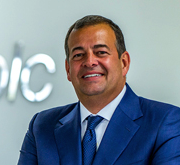Simon Smith has been named as Elitetele.com's first Head of Cloud Sales.
His remit is to educate new and existing customers on hosting infrastructure, expand Elitetele.com's cloud services and launch a series of new offerings in 2015.
Smith is well practiced at advising teams on the security, application, connectivity and disaster recovery aspects of cloud solutions, and has successfully managed business for international companies.
This new hire builds on Elitetele.com's acquisition of a data centre in 2014, a move that completed the company's transition from a switchless reseller to a full ISP with carrier capabilities and multiple data centre facilities.
With the acquisition, Elite officially launched a range of data centre services, including managed firewalls, unified threat management, colocation and its very own hosted PBX, Elite Plus Talk, which is embedded within its own core MPLS Network.
Smith said: "Cloud is an area many organisations still struggle with and Elitetele.com has a successful track record in understanding its customers' issues and providing quality solutions underpinned by great products."
Matt Newing, CEO of Elitetele.com, added: "With over a quarter of our customers using three or more of our services we're in a strong position to build on this with our new cloud offerings launching later this year. I know Simon will help us reach our goal of providing our customers with the right cloud services."

 Dorset-based 4Com was ranked 12th in the Sunday Times Best Companies Top 100 during a business awards ceremony at Battersea Evolution in London on 25th February.
Dorset-based 4Com was ranked 12th in the Sunday Times Best Companies Top 100 during a business awards ceremony at Battersea Evolution in London on 25th February. Hosted comms is the de facto lifeline for comms resellers stymied by diminishing revenues from traditional voice, according to Nick Guite (pictured), General Manager, Indirect and International Sales at BT Wholesale.
Hosted comms is the de facto lifeline for comms resellers stymied by diminishing revenues from traditional voice, according to Nick Guite (pictured), General Manager, Indirect and International Sales at BT Wholesale.